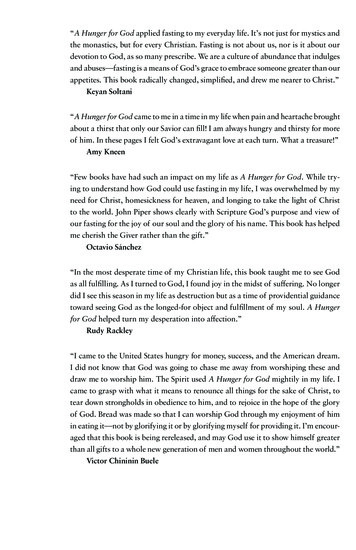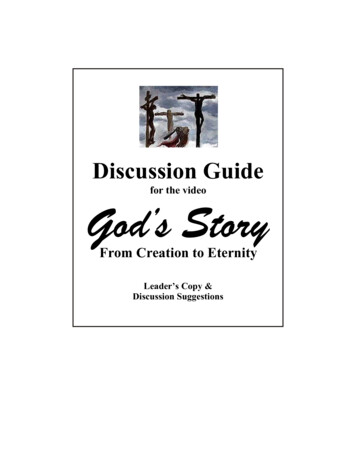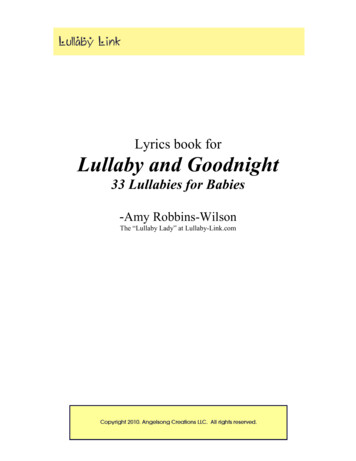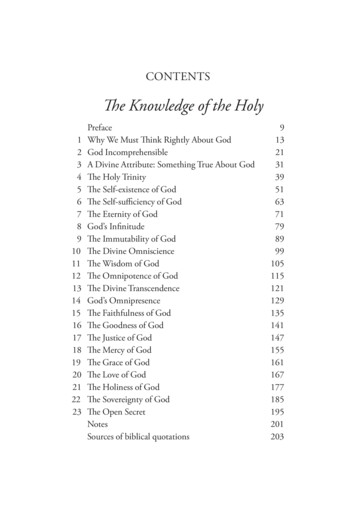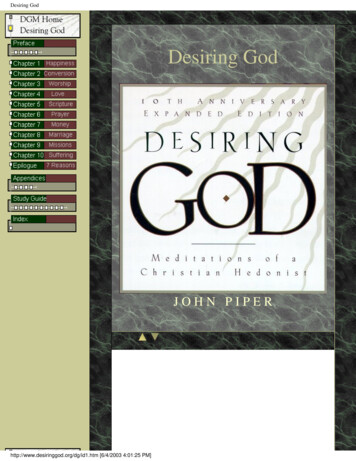
Transcription
Desiring GodDesiring GodJOHN PIPERhttp://www.desiringgod.org/dg/id1.htm [6/4/2003 4:01:25 PM]
ContentsContentsCONTENTSWhat's New In the 1996 Edition?PrefaceIntroduction: How I Became a Christian HedonistWhat Is Christian Hedonism? Lessons from a Love Poem1. The Happiness of God: Foundation for Christian Hedonism2. Conversion: The Creation of a Christian Hedonist3. Worship: The Feast of Christian Hedonism4. Love: The Labor of Christian Hedonism5. Scripture: Kindling for Christian Hedonism6. Prayer: The Power of Christian Hedonism7. Money: The Currency of Christian Hedonism8. Marriage: A Matrix for Christian Hedonism9. Missions: The Battle Cry of Christian Hedonism10. Suffering: The Sacrifice of Christian HedonismEpilogue: Why I Have Written This Book-Seven ReasonsAppendix 1: The Goal of God in Redemptive HistoryAppendix 2: Is the Bible a Reliable Guide to Lasting Joy?Appendix 3: What Does It Mean to Love Your Neighbor as You LoveYourself?Appendix 4: Why Call It Christian Hedonism?Study GuideIntroduction Chapter 1 Chapter 2 Chapter 4 Chapter 5 Chapter 6Chapter 7 Chapter 8 Chapter 9 Chapter 10A Note on the Resources of Desiring God MinistriesOther Books by the AuthorScripture Indexhttp://www.desiringgod.org/dg/id63.htm (1 of 2) [6/4/2003 4:01:31 PM]
ContentsSubject and Person IndexUsed by permission of Multnomah Publishers, copyright 1986, 1996.This text is for online reading purposes only and should not beprinted, recopied, duplicated, transferred or used for any other purposewithout the express written consent of Multnomah Publishers 3.htm (2 of 2) [6/4/2003 4:01:31 PM]
Whats NewWhat's NewWhat is New about the1996 Edition?A new preface"After Ten Years"An expansion of the Introduction"How I became a Christian Hedonist"What is Christian Hedonism?Lessons from a Love PoemAn updating of Chapter 9"Missions: The Battle Cry of Christian Hedonism"An additional chapterChapter 10: "Suffering: The Sacrifice of Christian Hedonism"An expansion of Appendix Three"What Does It Mean to Love Your Neighbor As Yourself?"A Study Guide prepared by the authorSome wording improvements and new subheadingsUsed by permission of Multnomah Publishers, copyright 1986, 1996.This text is for online reading purposes only and should not beprinted, recopied, duplicated, transferred or used for any other purposewithout the express written consent of Multnomah Publishers 5.htm [6/4/2003 4:03:06 PM]
Preface After Ten YearsPreface "After Ten Years"PrefaceAfter Ten YearsThere is a kind of happiness and wonderthat makes you serious.C. S. LewisThe Last BattleThis is a serious book about being happy in God. It's about happinessbecause that is what our Creator commands: "Delight yourself in the Lord!"( Psalm 37:4). And it is serious because, as Jeremy Taylor said, "Godthreatens terrible things if we will not be happy."The heroes of this book are Jesus Christ, who "endured the cross for thejoy that was set before him;" and St. Paul, who was "sorrowful, yet alwaysrejoicing;" and Jonathan Edwards, who deeply savored the sweetsovereignty of God; and C.S. Lewis, who knew that the Lord "finds ourdesires not too strong but too weak;" and all the missionaries who have lefteverything for Christ and in the end said, " I never made a sacrifice."Ten years have passed since Desiring God first appeared in 1986. Thesignificance of a truth is judged in part by whether over time it hastransforming power in very different circumstances. What about themessage of this book? Since its first edition my body has passed from aforty-year-old body to a fifty-year-old body. My marriage advanced from a17-year-old marriage to a 27-year-old marriage. My pastorate at BethlehemBaptist Church has persisted from six years to sixteen years. My oldest songrew from 13 and single to 23 and married. Noel and I have nurturedKarsten and Benjamin through the teen years, and Abraham and Barnabasare still in this critical season. In 1986 there were no daughters. Now thereis Talitha Ruth whom we adopted at 9 weeks in December of 1995.In other words things have changed. But not my commitment to themessage of this book. It is my life. That God is most glorified in me when Iam most satisfied in him continues to be a spectacular and precious truth inmy mind and heart. It has sustained me into my second half-century, and Ido not doubt that it will carry me Home.I have added a chapter called "Suffering: The Sacrifice of ChristianHedonism." The reason is partly biographical and partly biblical. Thesehave been the hardest ten years of my life. Marriage, we found, passesthrough deep water as husband and wife pass through midlife. We made it.But we will not diminish the disquietude of those years. We were notashamed to seek help. God was good to us. Entering our sixth decade oflife and nearing our fourth decade of marriage, the roots are deep, thehttp://www.desiringgod.org/dg/id86.htm (1 of 4) [6/4/2003 4:03:18 PM]
Preface After Ten Yearscovenant is solid, the love is sweet.The other "marriage" in my life (with Bethlehem Baptist Church) has been amingling of heartache and happiness. Can so much devastation and somuch delight coexist in one community and one soul? It can. The apostlePaul spoke a deep pastoral reality when he said that he was "sorrowful yetalways rejoicing" (2 Corinthians 6:10). There is a joy without which pastorscannot profit their people ( Hebrews 13:17). Mercifully, God has preservedit for sixteen years. And the truth of this book has been his means.Biblically, I have not been able to escape, in these passing years, that weare appointed to suffer for the advancement of the kingdom in the world."Through many tribulations we must enter the kingdom of God" (Acts14:22). Yes, but also others must enter the kingdom through ourtribulations. "I endure all things for the sake of the elect, that they also mayobtain salvation" (2 Timothy 2:10). "I am being poured out as a drinkoffering on the sacrifice and service of your faith" (Philippians 2:17). "If weare afflicted, it is for your comfort and salvation" ( 2 Corinthians 1:6). It isclearer to me now than ever, as the third millennium dawns that the finalsaving purposes of God in the world will triumph only through the lovingsacrifice of suffering. Chapter Ten has been added as a passionate call tojoin Jesus on the Calvary road of suffering "for the joy set before us."During these ten years since Desiring God first appeared, I have beentesting it and applying its vision in connection with more of life and ministryand God. The more I do so, the more persuaded I become that it will bearall the weight I can put on it. You can test this for yourself in relation to thenature of God (The Pleasures of God, Multnomah, 1991) the gravity andgladness of preaching (The Supremacy of God in Preaching, Baker BookHouse, 1990), the power and the price of world evangelization (Let theNations Be Glad, Baker Book House, 1993), the meaning of marriage(What's the Difference, Crossway Books, 1990) and the daily battle againstunbelief and sin (The Purifying Power of Living by Faith in Future Grace,Multnomah, 1995). The more I reflect and the more I minister and the moreI live, the more all-encompassing the vision of God and life in this bookbecomes.The older I get the more I am persuaded that Nehemiah 8:10 is crucial forliving and dying well: "The joy of the Lord is your strength." As we growolder and our bodies weaken, we must learn from the Puritan pastorRichard Baxter, who died in 1691, to redouble our efforts to find strengthfrom spiritual joy, not natural supplies. He prayed, "May the Living God,who is the portion and rest of the saints, make these our carnal minds sospiritual, and our earthly hearts so heavenly, that loving him, and delightingin him, may be the work of our lives."1 When delighting in God is the work ofour lives (which I call Christian Hedonism), there will be an inner strengthfor ministries of love to the very end.J. I. Packer described this dynamic in Baxter's life: "The hope of heavenbrought him joy, and joy brought him strength, and so, like John Calvinbefore him and George Whitefield after him (two verifiable examples) and, itwould seem, like the apostle Paul himself . . . he was astoundingly enabledhttp://www.desiringgod.org/dg/id86.htm (2 of 4) [6/4/2003 4:03:18 PM]
Preface After Ten Yearsto labor on, accomplishing more than would ever have seemed possible ina single lifetime."2But not only does the pursuit of joy in God give strength to endure, it is thekey to breaking the power of sin on our way to heaven. Matthew Henry,another Puritan pastor, put it like this: "The joy of the Lord will arm usagainst the assaults of our spiritual enemies and put our mouths out of tastefor those pleasures with which the tempter baits his hooks."3This is the great business of life -- to "put our mouths out of taste for thosepleasures with which the tempter baits his hooks." I know of no other wayto triumph over sin long-term, than to gain a distaste for it, because of asuperior satisfaction in God. One of the reasons this book is still "working"after ten years is that this truth simply does not and will not change. Godremains gloriously all-satisfying. The human heart remains a ceaselessfactory of desires. Sin remains powerfully and suicidally appealing. Thebattle remains: where will we drink? Where will we feast? ThereforeDesiring God is still a compelling and urgent message. Feast on God.If God would be pleased to use this book to raise up one man or woman inthe line of serious and happy saints who inspired it, then those of us whohave rejoiced in the making of this book would delight all the more in thedisplay of God's grace. It has indeed been a happy work. And my heartoverflows to many:Steve Halliday believed in the book from the beginning and has remained afaithful friend and helpful editor even through this new edition.As with almost everything I do, the influence of Daniel P. Fuller pervades. Itwas his class in 1968 where the seminal discoveries were made. I would behappy to view this book as explanation and application of his great book,Unity of the Bible (Zondervan, 1992). He remains a treasured friend andmentor.My friend and assistant and partner in the Great Work, Jon Bloom, madethe revision possible in the middle of our busy advent season of 1995.Jon's passion for the supremacy of God expressed in this book is aprecious source of energy for me.Carol Steinbach, after ten years, was willing again to tackle the indexes andgive the book her sharp editorial attention. Now, moreso than ever, I do nottake the constancy of friendships for granted.Chapter Eight is the tribute to my wife Noèl. Our first 17 years togethercoincided exactly with the gestation period of this book. Our next ten yearstogether have proved its value. The marriage has been indeed a "Matrix forChristian Hedonism." The mystery of mirroring Christ and the Church is aninexhaustible spring of hope that finding our joy in the holy joy of the otherwill make us one until the departure of death.The church that I love and serve heard the chapters in sermon-form back in1983. Of course the length has quadrupled since then. And they have nothttp://www.desiringgod.org/dg/id86.htm (3 of 4) [6/4/2003 4:03:18 PM]
Preface After Ten Yearsbegrudged my labor! The partnership that I enjoy with the elders and staffis priceless. There is a chapter yet to be written. It is called "TheCamaraderie of Christian Hedonism." May the Spirit himself write it on thetablets of our hearts!Finally, a word to my father. The dedicatory words I wrote in 1986 are stilltrue ten years later. I can recall Mother laughing so hard at the dinner tablethat the tears ran down her face. She was a very happy woman. Butespecially when you came home on Monday. You had been gone twoweeks. Or sometimes three or four. She would glow on Monday morningswhen you were coming home.At the dinner table that night (these were the happiest of times in mymemory) we would hear about the victories of the gospel. Surely it is moreexciting to be the son of an evangelist than to sit with knights and warriors.As I grew older I saw more of the wounds. But you spared me most of thatuntil I was mature enough to "count it all joy." Holy and happy were thoseMonday meals. O, how good it was to have you home!John PiperDecember,1995Minneapolis,MinnesotaUsed by permission of Multnomah Publishers, copyright 1986, 1996.This text is for online reading purposes only and should not beprinted, recopied, duplicated, transferred or used for any other purposewithout the express written consent of Multnomah Publishers (1-800-929-0910).Notes, Preface1. Richard Baxter, The Saints' Everlasting Rest, (Grand Rapids: Baker Book House,1978), p.17 (emphasis added).2. J. I. Packer, "Richard Baxter on Heaven, Hope and Holiness," in Alive to God: Studiesin Spirituality, eds, J. I. Packer and Loren Wilkinson, (Downers Grove: InterVarsity Press,1992), p. 165.3. Matthew Henry, Commentary on the Whole Bible, Vol. 2, (Old Tappan, NJ: Fleming H.Revel, n.d., orig. 1708), p. 1096http://www.desiringgod.org/dg/id86.htm (4 of 4) [6/4/2003 4:03:18 PM]
IntroductionIntroductionIntroductionHow I Became a Christian HedonistYou might turn the world on its head by changing one word in your creed.The old tradition says,The chief end of man is to glorify GodANDenjoy him forever."And"? Like ham and eggs? Sometimes you glorify God and sometimesyou enjoy him? Sometimes he gets glory, sometimes you get joy? "And" isa very ambiguous word! Just how do these two things relate to eachother?Evidently the old theologians didn't think they were talking about twothings. They said "chief end," not "chief ends." Glorifying God and enjoyinghim were one end in their minds, not two. How can that be?That's what this book is about.Not that I care too much about the intention of seventeenth centurytheologians. But I care tremendously about the intention of God inScripture. What does God have to say about the chief end of man? Howdoes God teach us to give him glory? Does he command us to enjoy him?If so, how does this quest for joy in God relate to everything else? Yes,everything! "Whether you eat or drink, or whatever you do, do all to theglory of God."The overriding concern of this book is that in all of life God be glorified theway he himself has appointed. To that end this book aims to persuade youthatThe chief end of man is to glorify GodBYenjoying him forever.How I Became a Christian HedonistWhen I was in college I had a vague, pervasive notion that if I didsomething good because it would make me happy, I would ruin itsgoodness.I figured that the goodness of my moral action was lessened to the degreeI was motivated by a desire for my own pleasure. At the time, buying icecream in the student center just for pleasure didn't bother me, because themoral consequences of that action seemed so insignificant. But to bemotivated by a desire for happiness or pleasure when I volunteered forhttp://www.desiringgod.org/dg/id87.htm (1 of 9) [6/4/2003 4:03:29 PM]
IntroductionChristian service or went to church-that seemed selfish, utilitarian,mercenary.This was a problem for me because I couldn't formulate an alternativemotive that worked. I found in me an overwhelming longing to be happy, atremendously powerful impulse to seek pleasure, yet at every point ofmoral decision I said to myself that this impulse should have no influence.One of the most frustrating areas was that of worship and praise. Myvague notion that the higher the activity, the less there must be of selfinterest in it, caused me to think of worship almost solely in terms of duty.And that cuts the heart out of it.Then I was converted to Christian Hedonism. In a matter of weeks I cameto see that it is unbiblical and arrogant to try to worship God for any otherreason than the pleasure to be had in him. Let me describe the series ofinsights that made me into a Christian Hedonist. Along the way I hope itwill become clear what I mean by this strange phrase.1. During my first quarter in seminary I was introduced to the argument forChristian Hedonism and one of its great exponents, Blaise Pascal. Hewrote,All men seek happiness. This is without exception. Whateverdifferent means they employ, they all tend to this end. Thecause of some going to war, and of others avoiding it, is thesame desire in both, attended with different views. The willnever takes the least step but to this object. This is the motiveof every action of every man, even of those who hangthemselves.1This statement so fit with my own deep longings and all that I had everseen in others that I accepted it and have never found any reason to doubtit. What struck me especially here was that Pascal was not making anymoral judgment about this fact. As far as he was concerned, seeking one'sown happiness is not a sin; it is a simple given in human nature. It is a lawof the human heart as gravity is a law of nature.This thought made great sense to me and opened the way for the seconddiscovery.2. I had grown to love the work of C. S. Lewis in college. But not until laterdid I buy the sermon called "The Weight of Glory." The first page of thatsermon is one of the most influential pages of literature I have ever read. Itgoes like this:http://www.desiringgod.org/dg/id87.htm (2 of 9) [6/4/2003 4:03:29 PM]
IntroductionIf you asked twenty good men today what they thought thehighest of the virtues, nineteen of them would reply,Unselfishness. But if you asked almost any of the greatChristians of old he would have replied, Love. You see whathas happened? A negative term has been substituted for apositive, and this is of more than philological importance. Thenegative ideal of Unselfishness carries with it the suggestionnot primarily of securing good things for others, but of goingwithout them ourselves, as if our abstinence and not theirhappiness was the important point. I do not think this is theChristian virtue of Love. The New Testament has lots to sayabout self-denial, but not about self-denial as an end in itself.We are told to deny ourselves and to take up our crosses inorder that we may follow Christ; and nearly every description ofwhat we shall ultimately find if we do so contains an appeal todesire.If there lurks in most modern minds the notion that to desireour own good and earnestly to hope for the enjoyment of it is abad thing, I submit that this notion has crept in from Kant andthe Stoics and is no part of the Christian faith. Indeed, if weconsider the unblushing promises of reward and the staggeringnature of the rewards promised in the Gospels, it would seemthat Our Lord finds our desires not too strong, but too weak.We are half-hearted creatures, fooling about with drink and sexand ambition when infinite joy is offered us, like an ignorantchild who wants to go on making mud pies in a slum becausehe cannot imagine what is meant by the offer of a holiday atthe sea. We are far too easily pleased.2There it was in black and white, and to my mind it was totally compelling: Itis not a bad thing to desire our own good. In fact the great problem ofhuman beings is that they are far too easily pleased. They don't seekpleasure with nearly the resolve and passion that they should. And so theysettle for mud pies of appetite instead of infinite delight.I had never in my whole life heard any Christian, let alone a Christian ofLewis's stature, say that all of us not only seek (as Pascal said) but alsoought to seek our own happiness. Our mistake lies not in the intensity ofour desire for happiness, but in the weakness of it.3. The third insight was there in Lewis's sermon, but Pascal made it moreexplicit. He goes on to say,There once was in man a true happiness of which now remain to him onlythe mark and empty trace, which he in vain tries to fill from all hissurroundings, seeking from things absent the help he does not obtain inthings present. But these are all inadequate, because the infinite abysscan only be filled by an infinite and immutable object, that is to say, onlyby God Himself. 3As I look back on it now it seems so patently obvious, I don't know how Icould have missed it. All those years I had been trying to suppress myhttp://www.desiringgod.org/dg/id87.htm (3 of 9) [6/4/2003 4:03:29 PM]
Introductiontremendous longing for happiness so I could honestly praise God out ofsome "higher," less selfish motive. But now it started to dawn that thispersistent and undeniable yearning for happiness was not to besuppressed but was to be glutted-on God! The growing conviction thatpraise should be motivated solely by this happiness we find in Godseemed less and less strange.4. The next insight came again from C. S. Lewis, but this time from hisReflections on the Psalms. Chapter nine of this book bears the modesttitle "A Word about Praise." In my experience it has been the word aboutpraise-the best word on the nature of praise I have ever read.Lewis says that as he was beginning to believe in God, a great stumblingblock was the presence of demands scattered through the Psalms that heshould praise God. He did not see the point in all this; besides, it seemedto picture God as craving "for our worship like a vain woman who wantscompliments." He goes on to show why he was wrong.But the most obvious fact about praise-whether of God or anythingstrangely escaped me. I thought of it in terms of compliment, approval, orthe giving of honor. I had never noticed that all enjoyment spontaneouslyoverflows into praise. The world rings with praise-lovers praising theirmistresses, readers their favorite poet, walkers praising the countryside,players praising their favorite game.My whole, more general, difficulty about the praise of God depended onmy absurdly denying to us, as regards the supremely Valuable, what wedelight to do, what indeed we can't help doing, about everything else wevalue.I think we delight to praise what we enjoy because the praise not merelyexpresses but completes the enjoyment; it is its appointedconsummation.4This was the capstone of my emerging hedonism. Praising God, thehighest calling of humanity and our eternal vocation, did not involve therenunciation but rather the consummation of the joy I so desired. My oldeffort to achieve worship with no self-interest in it proved to be acontradiction in terms. Worship is basically adoration, and we adore onlywhat delights us. There is no such thing as sad adoration or unhappypraise.We have a name for those who try to praise when they have no pleasurein the object. We call them hypocrites. This fact-that praise meansconsummate pleasure and that the highest end of man is to drink deeplyof this pleasure-was perhaps the most liberating discovery I ever made.5. Then I turned to the Psalms for myself and found the language ofhedonism everywhere. The quest for pleasure was not even optional, butcommanded: "Delight yourself in the Lord; and he will give you the desiresof your heart" ( Psalm 37:4).http://www.desiringgod.org/dg/id87.htm (4 of 9) [6/4/2003 4:03:29 PM]
IntroductionThe psalmists sought to do just this: "As the deer pants for the waterbrooks, so my soul pants for thee, O God, for the living God" (Psalm 42:12). "My soul thirsts for thee, my flesh yearns for thee, in a dry and wearyland where there is no water" (Psalm 63:1). The motif of thirsting has itssatisfying counterpart when the psalmist says that men "drink their fill ofthe abundance of thy house; and thou dost give them to drink of the riverof thy delights" ( Psalm 36:8).I found that the goodness of God, the very foundation of worship, is not athing you pay your respects to out of some kind of disinterestedreverence. No, it is something to be enjoyed: "O taste and see that theLord is good" (Psalm 34: 8) . "How sweet are thy words to my taste! Yes,sweeter than honey to my mouth!" ( Psalm 119:103).As C. S. Lewis says, God in the Psalms is the "all-satisfying Object." Hispeople adore him unashamedly for the "exceeding joy they find in him"(Psalm 43:4). He is the source of complete and unending pleasure: "In thypresence is fullness of joy; in thy right hand there are pleasures forever"( Psalm 16:11).That is the short story of how I became a Christian Hedonist. I have nowbeen brooding over these things for some eighteen years, and there hasemerged a philosophy that touches virtually every area of my life. I believeit is biblical, that it fulfills the deepest longings of my heart, and that ithonors the God and Father of our Lord Jesus Christ. I have written thisbook to commend these things to all who will listen.Many objections rise in people's minds when they hear me talk this way. Ihope the book will answer the most serious problems. But perhaps I candefuse some of the resistance in advance by making a few brief clarifyingcomments.First, Christian Hedonism as I use the term does not mean God becomesa means to help us get worldly pleasures. The pleasure ChristianHedonism seeks is the pleasure which is in God himself. He is the end ofour search, not the means to some further end. Our exceeding joy is he,the Lord-not the streets of gold, or the reunion with relatives or anyblessing of heaven. Christian Hedonism does not reduce God to a keythat unlocks a treasure chest of gold and silver. Rather it seeks totransform the heart so that "the Almighty will be your gold and choicesilver to you" ( Job 22:25).Second, Christian Hedonism does not make a god out of pleasure. It saysthat one has already made a god out of whatever he finds most pleasurein. The goal of Christian Hedonism is to find most pleasure in the one andonly God and thus avoid the sin of covetousness, that is, idolatry( Colossians 3:5).Third, Christian Hedonism does, not put us above God when we seek himout of self-interest. A patient is not greater than his physician. I will saymore about this in chapter three.http://www.desiringgod.org/dg/id87.htm (5 of 9) [6/4/2003 4:03:29 PM]
IntroductionFourth, Christian Hedonism is not a "general theory of moral justification."5In other words nowhere do I say: an act is right because it bringspleasure. My aim is not to decide what is right by using joy as a moralcriterion. My aim is to own up to the amazing, and largely neglected fact,that some dimension of joy is a moral duty in all true worship and allvirtuous acts. I do not say that loving God is good because it brings joy. Isay God commands that we find joy in loving God. ("Delight yourself in theLord," Psalm 37:4). I do not say that loving people is good because itbrings joy. I say that God commands that we find joy in loving people("Let the one who shows mercy do so with cheerfulness," Romans12:8).6I do not come to the Bible with a hedonistic theory of moral justification.On the contrary I find in the Bible a divine command to be a pleasureseeker -- that is, to forsake the two-bit, low-yield, short-term, neversatisfying, person-destroying, God-belittling pleasures of the world and tosell everything "with joy" (Matthew 13:44) in order to have the kingdom ofheaven, and thus "enter into the joy of your Master" ( Matthew 25:21,23).In short, I am a Christian Hedonist not for any philosophical, or theoreticalreason, but because God commands it (though he doesn't command thatyou use these labels!).Fifth, I do not say that the relationship between love and happiness is this:"true happiness requires love." This is an oversimplification that missesthe crucial and defining point. The distinguishing feature of ChristianHedonism is not that pleasure-seeking demands virtue, but that virtueconsists essentially, though not only, in pleasure-seeking.The reason I come to this conclusion is that I am operating here not as aphilosophical hedonist but as a Biblical theologian and pastor who mustcome to terms with divine commands to "love mercy" (not just do it, Micah 6:8), to "show mercy with cheerfulness" ( Romans 12:8), to suffer loss "with joy" in the service of prisoners ( Hebrews10:34), to be cheerful giver ( 2 Corinthians 9:7), to make our joy the joy of others ( 2 Corinthians 2:3), to tend the flock of God willingly and eagerly ( 1 Peter 5:2),and to keep watch over souls "with joy" ( Hebrews 13:17).When you reflect long and hard on such amazing commands, the moralimplications are stunning. Christian Hedonism attempts to take thesedivine commands with blood-earnestness. The upshot is piercing andradically life-changing: the pursuit of true virtue includes the pursuit of thejoy, because joy is an essential component of true virtue. This is vastlydifferent from saying, let's all be good because it will make us happy.Sixth, Christian Hedonism is not a distortion of historic ReformedCatechisms of faith. This was one of the criticisms of Richard Mouw in hisbook, The God Who Commands. He said,http://www.desiringgod.org/dg/id87.htm (6 of 9) [6/4/2003 4:03:29 PM]
IntroductionPiper might be able to alter the first answer in the WestminsterShorter Catechism -- so that glorifying and enjoying Godbecomes glorifying by enjoying the deity -- to suit his hedonisticpurposes, but it is a little more difficult to alter the opening linesof the Heidelberg Catechism: That I, with body and soul, both inlife and death, am not my own but belong unto my faithfulSavior Jesus Christ . . ."7The remarkable thing about the beginning of the Heidelberg Catechism isnot that I can't change it for hedonistic purposes but that I don't have to. Italready places the entire Catechism under the human longing for"comfort." Question One: "What is your only comfort in life and death?"The pressing question for critics of Christian Hedonism is: Why did theoriginal framers of this 400-year-old catechism structure all 129 questionsso that they are an exposition of the question, "What is my only comfort . ."?Even more remarkable is to see the concern with "happines
2. Conversion: The Creation of a Christian Hedonist 3. Worship: The Feast of Christian Hedonism 4. Love: The Labor of Christian Hedonism 5. Scripture: Kindling for Christian Hedonism 6. Prayer: The Power of Christian Hedonism 7. Money: The Currency of Christian Hedonism 8. Marriage: A Matrix for Christian Hedonism 9. Missions: The Battle Cry of .

